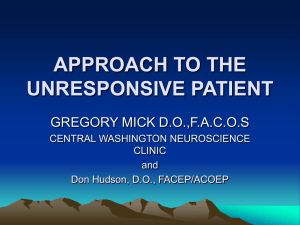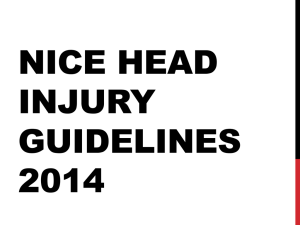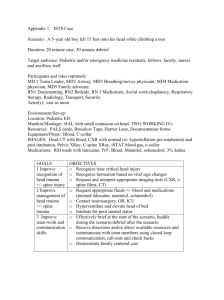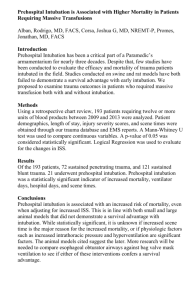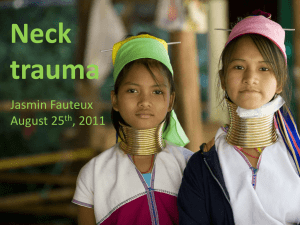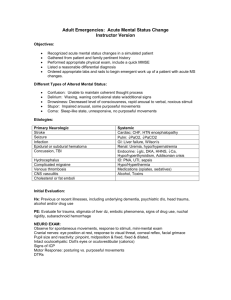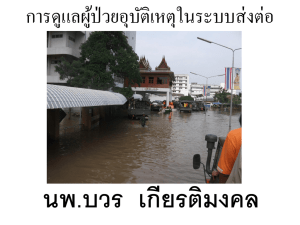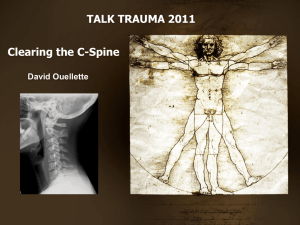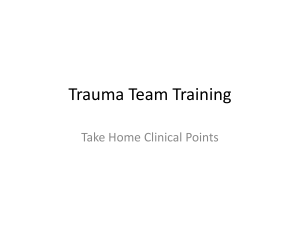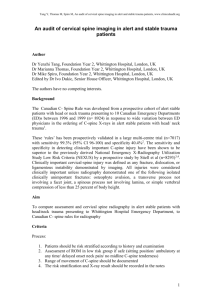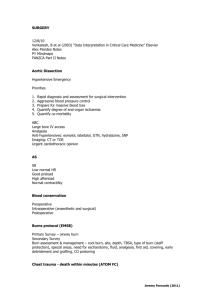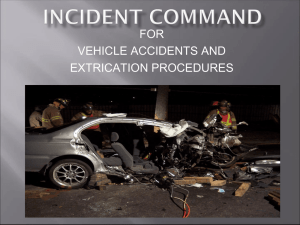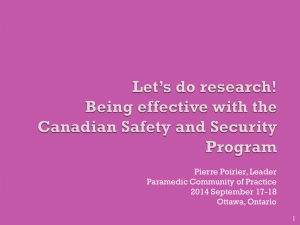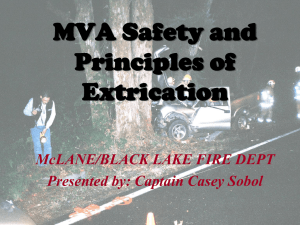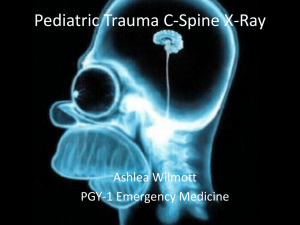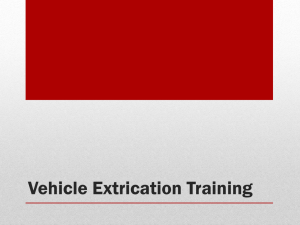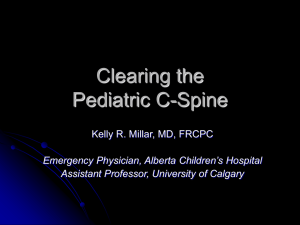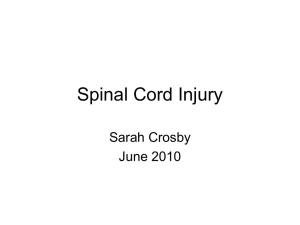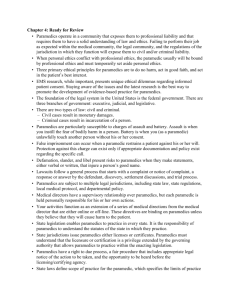EMS stabilization
advertisement
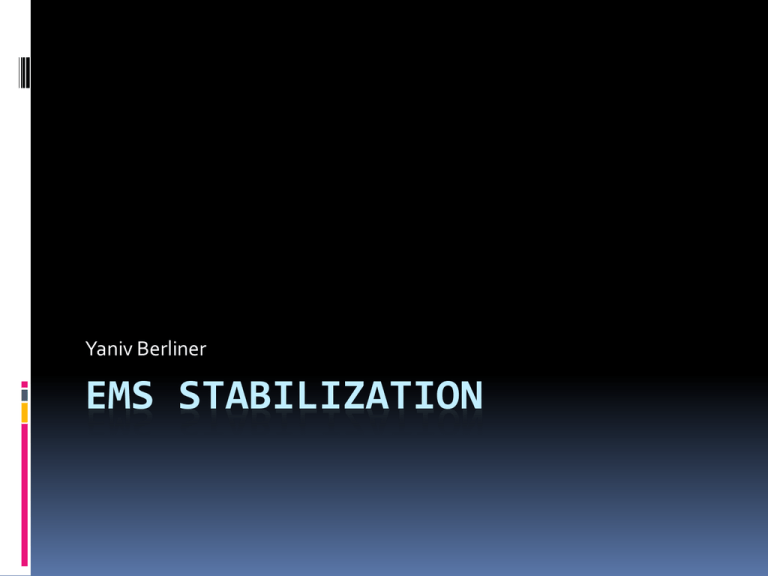
Yaniv Berliner EMS STABILIZATION Scene survey EMS must first evaluate the safety of the scene. Downed power lines, fire, traffic Is there a need for specialized equipment for extrication. Is there a need for air ambulance What type of facility is nearby? Are all patients accounted for. Is there a possibility of ejected patients. What type of crew In Ontario, either Primary Care Paramedic (PCP) or Advanced Care Paramedic (ACP). ACP’s have further education and preceptorship. ACP’s have a wider scope of practice. In trauma they are able to initiate IV bolus, perform needle decompression and endotrachael intubation (with base hospital support) Primary Survey ABCD assessment of both patients Does the mother warrant airway protection due to GCS? If there is only one crew on site, who should be managed first? Unless extrication causes delay, limit on scene time to 10 minutes Airway Airway interventions as per ATLS O2 applied Jaw thrust BMV More advanced airway interventions are usually reserved for receiving hospital (if it is nearby) Intubate GCS<8 in field? (Prehospital Emergency Care, 2011 15 184) Trauma Registry 1,555 patients. Chart review. Intubation attempted in 758 patients 57% mortality, intubation group. 34% mortality, non intubation group Patients in the intubation group were more critically injured. Lower GCS (4.3 vs 5.3) More SBP<90 (28 % vs 17%) Probably represents a selection bias whereby when a decision to intubate is undertaken the patient is sicker Site Intubation % Overall mortality Morality in Those Intubated TOR 18 46 68 MLW 30 50 81 DAL 37 62 79 IWA 41 39 57 OTT 45 50 74 ARC 45 38 62 PTL 50 31 48 PGH 54 47 50 VAN 68 58 63 SKC 75 35 39 Breathing Oxygen and ventilatory support are provided Needle decompression for tension pneumothorax. This is done in conjunction with base hospital. Indications are: Severe shortness of breath SBP less than 90 Absent breath sounds Occlusive dressing is placed over an open pneumothorax Circulation Paramedics assess circulation. If systolic pressure is <100, 20cc/kg IV NS is administered. Lacerations are bandaged Unstable Pelvis injuries are tied MSK injuries are splinted Disability Extrication with full c-spine precautions Collar is placed first, then pt is placed on board Board is padded over pressure points Pt is then placed on a long board C-spine injury is presumed in any patient involved in MVC, fall from height, dangerous mechanism, neck pain, neurological symptoms or decreased level of consciousness. Clearing C-spine in the Field Canadian C-spine rule interpreted by paramedics Clinical decision rule is applied, but the patient remains immobilized Pt is brought to ER for assessment. The reliability of rule application is determined and compared to investigators (ER docs) C-spine rules Clearing in the Field 1949 patients evaluated 12 c-spine injuries Paramedics 100% sensitive in identifying patients with potential injury Paramedic specificity 43%, versus 38% for investigators (some overcalling by EMS) Clearing C-spine If paramedics were allowed to use rule 62% of patients would require immobilization in the field, compared to actual rate of 100%. This in turn saves ER space, xrays, less time on board. Pain management Advanced care paramedics may administer analgesia for isolated extremity fractures Morphine or Fentanyl For multi-system trauma base hospital is contacted for analgesia orders Load and Go Patients What it sounds like. In trauma in the setting of severe multi-system injury (severe chest injuries, head injury with lateralizing signs, severe abdominal pain post trauma, unstable pelvis, bilateral femur fractures) Primary assessment performed. Oxygen applied. Pt is placed on long board with c-spine immobilization and additional history/assessment is obtained en route Dispatch is made aware Back to Case: Mother Scene Survey, limit scene time to 10 min Primary Survey Full immobilization 02 applied, ventilation assisted IV initiated, 20cc/kg NS given Splint for femur fracture Transport initiated Benzodiazepines as needed for seizure from presumed head injury Secondary survey en route Daughter Scene Survey Primary Survey Collar placed Three person extrication with full c-spine precaution Full board IV initiated Base hospital contacted for analgesia OPALS A before-after controlled clinical trial to assess the benefit of prehospital advanced life support program. 1373 BLS patients: 1494 ALS patients No substantial difference in overall survival to hospital discharge (81.8% survival BLS, 81.1% survival ALS) OPALS 598 patients with GCS<9 Lower survival ALS (50 % survival ) then BLS (60%). Value was significant (p<0.03) Authors speculate this may be due to delay in transfer to hospital Acknowlegements Base Hospital Program. David Vusich Severo Rodrigues
